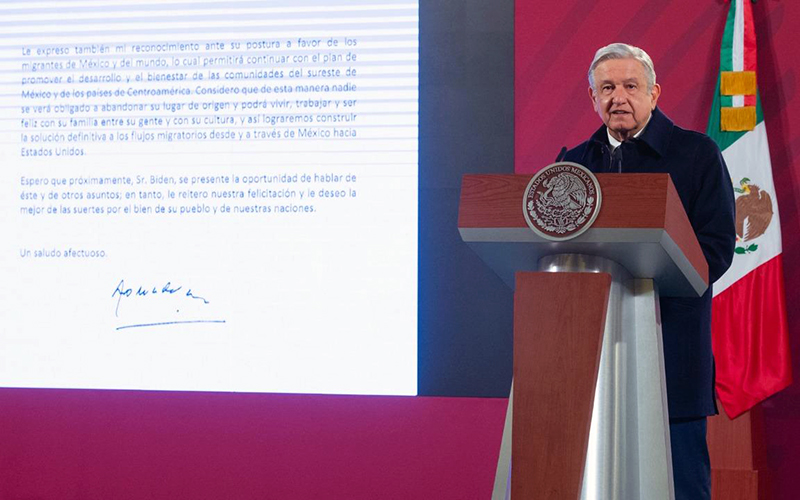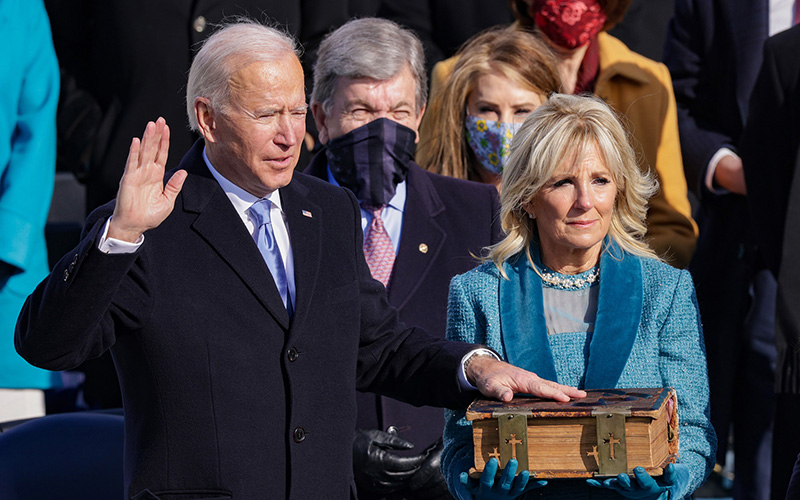
President Andrés Manuel López Obrador shows the congratulatory letter he sent Joe Biden during a news conference Dec. 14. López Obrador was one of the last foreign heads to acknowledge Biden’s victory in November. (Photo courtesy of Office of the Mexican President)

Amy Glover is a political analyst, columnist and partner of a public affairs consulting firm in Mexico City. She says former President Donald Trump used Mexico as a punching bag for internal political purposes. (Photo by Rodrigo Cervantes/KJZZ)

Heidi Smith, a professor at Universidad Iberoamericana in Mexico City, says the U.S.-Mexico relationship is “all about power and authority.” (Photo by Rodrigo Cervantes/KJZZ)
MEXICO CITY – During his first two years as president, Andrés Manuel López Obrador had to work with Donald Trump, who at times was antagonistic toward Mexico. During his last four years, he will work with a new president, Joe Biden.
What can we expect?
Mexico’s president, who’s widely know as AMLO, has been accused by some – and applauded by others – for the way he conducted Mexican-U.S. relations during the Trump administration. With Biden in the White House, many wonder about the future of the binational relationship.
AMLO was among the few leaders visiting Trump in the White House. He is also one of the last heads of state congratulating Biden on his November victory.
The apparent ambivalence of AMLO has generated concerns on the future of the bilateral relations.
“There won’t be confrontations with President Biden,” AMLO said in December. Mexico and the U.S. can’t be distant neighbors, he said, with more than 38 million Mexicans living in the U.S. and more than 1 million Americans in Mexico.
López Obrador said economic ties also are essential, particularly as border states, such as Texas, California and Arizona, could be economic superpowers by themselves.
The U.S. is Mexico’s top trade partner, and Mexico is a main U.S. trade partner. And trade has been the central issue in the tug of war between both countries.
“I would say, to put it nicely, that the relationship has been on ice for the past four years,” said Amy Glover, a Mexico-U.S. binational and an international political strategist.
She noted that Trump used Mexico as a punching bag for internal political purposes, like immigration, while threatening trade tariffs.
“What López Obrador agreed to, under Trump, having refugees stay in Mexico until their status is reviewed, is a major domestic issue for Mexico now,” Glover said.
The U.S. government will be focused internally, she said, but Biden has experience leading Latin American issues while vice president during the Obama administration and an interest to consolidate North America as an economic power.
“Biden has said he wants to reestablish solid relations with U.S. allies, and certainly Mexico is a critical partner for the U.S.,” Glover said.
The expert said AMLO’s pushback on renewable energies to favor the national oil industry will bring difficult conversations, along with labor issues addressed during the renegotiation of the U.S.-Mexico-Canada Trade Agreement, which replaced NAFTA.
“I think the U.S.-Mexico relationship is all about power and authority, and who has power to do what,” said Heidi Smith, a public policy and economics professor at Universidad Iberoamericana in Mexico City.
Smith said the power dynamic and authority might not change under Biden, but it most likely will become more collaborative and cordial, particularly as both presidents promised changes.
“That’s going to be a way to forge an agenda together to deal with corruption,” Smith said.
For her, immigration issues will ease as Biden has promised to change policies. But trade tensions are expected in industries such as pharmaceuticals, energy, automotive and air, because the rules for many contracts have changed under the USMCA.
“It’s not a free trade agreement – it doesn’t say free trade – and in reality, we have a very flexible arrangement,” Smith said.
Antonio Michel, a former officer in Mexico’s federal government, now is an international affairs researcher with the Instituto Tecnológico Autónomo de México. AMLO and Trump kept a friendly dialogue to sustain the binational relationship, he said.
“They’ve managed to find some common ground in very important subjects, but that does not necessarily translate into a bromance or a very close friendship,” Michel said.
AMLO didn’t recognize Biden’s victory sooner, he said, to keep on good terms with Trump, respect Mexico’s nonintervention policy and even as a deja vu of his own past, when he alleged voting frauds against him. But he said AMLO hasn’t done anything out of line from previous administrations.
“The bilateral agenda and the dialogue have so many levels and actors that it’s very hard for these two countries to change radically their relationship,” Michel said.
It’s a double-edged sword in which both nations need each other, he said, but Biden’s administration might prove itself less volatile than Trump’s.
“I do think it’s some sort of continuity of the Obama administration. I’ve read some experts have even dubbed it like Obama 2.0,” Michel said.
The analyst said both countries need a more solid partnership that strengthens their institutions. Biden and AMLO are trying to rebuild their countries – and shared problems need shared solutions, he said.
The Fronteras Desk is a KJZZ project that covers a wide expanse of an undercovered news desert that stretches from northern Arizona deep into northwestern Mexico.
